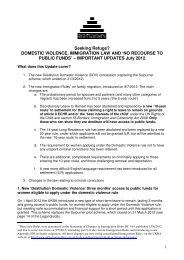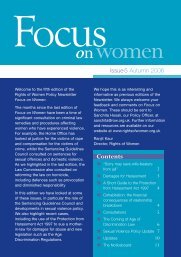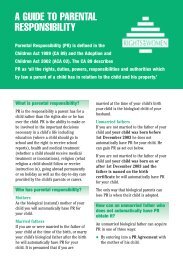Seeking Refuge? - Rights of Women
Seeking Refuge? - Rights of Women
Seeking Refuge? - Rights of Women
You also want an ePaper? Increase the reach of your titles
YUMPU automatically turns print PDFs into web optimized ePapers that Google loves.
If the Immigration Judge decides that you are not<br />
entitled to protection in the UK, your appeal<br />
against the UK Border Agency’s initial decision will<br />
be dismissed. It is important to get legal advice as<br />
soon as you are refused protection, as it may be<br />
possible to challenge this decision.<br />
Appeals against a decision<br />
made by the Asylum and<br />
Immigration Tribunal<br />
It may be possible to appeal against, or challenge<br />
the decision <strong>of</strong> an Immigration Judge. However,<br />
this can only be done in certain circumstances,<br />
such as if the Immigration Judge made an error<br />
<strong>of</strong> law (a mistake about the law and how it<br />
should be applied in your case).<br />
If the Immigration Judge has made an error <strong>of</strong><br />
law, then your case can be reconsidered.<br />
Reconsideration involves having a new hearing<br />
about your case and why you should be given<br />
protection in the UK, before a different<br />
Immigration Judge(s) in the AIT.<br />
There are also circumstances where it may be<br />
possible to appeal a decision to the Court <strong>of</strong><br />
Appeal, or The Supreme Court.<br />
The law on appealing determinations is complex.<br />
If you are considering appealing a determination<br />
you should seek legal advice from your legal<br />
representative, or one <strong>of</strong> the organisations listed<br />
below.<br />
If you are unable to appeal against a decision to<br />
refuse you protection to any other court, you have<br />
exhausted (finished) your rights to appeal and you<br />
become removable. For information about<br />
removal, see Chapter 9.<br />
Transfer <strong>of</strong> the Asylum and<br />
Immigration Tribunal<br />
The Government makes decisions in a number <strong>of</strong><br />
different areas <strong>of</strong> law that individuals may want to<br />
appeal against. For example, a person who has<br />
been refused welfare benefits or criminal injuries<br />
compensation may want to appeal against that<br />
decision to someone independent. If they do,<br />
then the place that they can appeal to is the Firsttier<br />
Tribunal. A tribunal is a type <strong>of</strong> court. The<br />
main function <strong>of</strong> the First-tier Tribunal is to hear<br />
appeals against decisions taken by the<br />
Government in certain areas <strong>of</strong> law, including<br />
welfare benefits, criminal injuries compensation<br />
and asylum support law.<br />
In 2009, the Government decided to transfer the<br />
Asylum and Immigration Tribunal into the Tribunal<br />
structure, so that it sits alongside the other<br />
Tribunals. It is expected that this transfer will<br />
happen sometime in 2010. This will mean that<br />
sometime in 2010, appeals against decisions<br />
taken by case-owners in the UK Border Agency<br />
will be heard in the First-tier Tribunal.<br />
The First-tier Tribunal is independent <strong>of</strong> the<br />
Home Office and decisions in the tribunal will be<br />
taken by judges. The rights <strong>of</strong> those who are<br />
appealing against a decision taken by their caseowner<br />
in the UK Border Agency will not be<br />
affected by this change. However, the procedure<br />
for applying for a reconsideration <strong>of</strong> a<br />
determination will change, as an application for<br />
an order for reconsideration will be made first to<br />
the First-tier Tribunal and, if they refuse, to the<br />
Upper Tribunal (rather than the Administrative<br />
Court, as is the case now). The process for<br />
judicially reviewing some types <strong>of</strong> decisions may<br />
also be changed by the transfer <strong>of</strong> the AIT.<br />
The law on appealing determinations is complex.<br />
If you are considering appealing a determination<br />
and you want to know more about whether or<br />
not these changes affect you, you should seek<br />
legal advice from your legal representative, or one<br />
<strong>of</strong> the organisations listed below.<br />
For more information about the First-tier<br />
Tribunal and the types <strong>of</strong> decisions that<br />
can be appealed against, visit:<br />
www.tribunals.gov.uk<br />
Things to remember<br />
• A claim for asylum or some other form <strong>of</strong><br />
protection in the UK is decided initially by a<br />
case-owner in the UK Border Agency. You<br />
may be able to appeal against a decision to<br />
refuse you protection, or to give you a form <strong>of</strong><br />
protection that is different to what you applied<br />
for, to the Asylum and Immigration Tribunal<br />
(the AIT).<br />
• Appealing against the decision <strong>of</strong> the UK<br />
Border Agency to the AIT is complicated, as is<br />
appealing against the decision <strong>of</strong> the AIT. It is<br />
therefore important that throughout these<br />
processes, you seek legal advice. If you do not<br />
have a legal representative, you should contact<br />
one <strong>of</strong> the support organisations listed below<br />
for advice.<br />
54
















